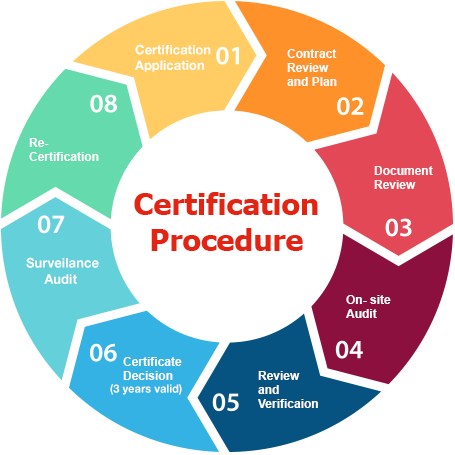ISO Certification
BCEB Certification provides Certification services to a variety of recognised Standards, covering areas such as Quality Management, Environmental Management, Occupational Health & Safety Management and Food Safety Management.
BCEB Certification not only understands the needs of small and medium sized business owners, it has been at the forefront of the development of management system standards that specifically address the needs of smaller sized organisations by specifying realistic and relevant requirements. These programs are certified using a tailored Certification process which ensures independent Certification comes within financial reach of smaller sized businesses, without compromising the quality or credibility of the Certification process.
Certification reduces the risks of doing business in an uncertain world.
steps to becoming ISO certified

why certify
Not all companies are created equal therefore they don’t have the same needs when it comes to getting ISO certified. If you are interested in getting ISO certified you should hire a consultant or company that will tailor the ISO plan to your needs to ensure your company will see the best results after the certification process. Once businesses earn their ISO certification they see positive results, here are just to few. Businesses who invest in earning their ISO certification can benefit tremendously from meeting their customers’ requirements, having the ability to bid on government contracts, improve their company’s product quality, increase customer satisfaction, increase revenue and get new customers, reduce costs, improve operation consistency, achieve international quality recognition and reduce costs.
we provide certification
The ISO 9001 standard provides an effective template for running your business in an efficient and effective way by ensuring you have a set of measures across the business that are clearly understood by everyone.
The internationally recognised Standard ISO 14001:2015 requires organisations to assess their environmental impacts, define objectives, implement an effective environmental system that drives continual improvement and monitor its performance.
Using energy efficiently helps organizations save money as well as helping to conserve resources and tackle climate change. ISO 50001 supports organizations in all sectors to use energy more efficiently, through the development of an energy management system (EnMS).
BS OHSAS 18001 is a framework for an occupational health and safety (ohs) management system and is a part of the OHSAS 18000 (sometimes incorrectly identified as ISO 18000) series of standards, along with OHSAS 18002. It can help you put in place the policies, procedures and controls needed for your organization to achieve the best possible working conditions and workplace health and safety, aligned to internationally recognized best practice.
The ISO 22000 family of International Standards addresses food safety management.
The consequences of unsafe food can be serious and ISO’s food safety management standards help organizations identify and control food safety hazards. As many of today’s food products repeatedly cross national boundaries, International Standards are needed to ensure the safety of the global food supply chain.
The ISO/IEC 27000 family of standards helps organizations keep information assets secure.
Using this family of standards will help your organization manage the security of assets such as financial information, intellectual property, employee details or information entrusted to you by third parties.
ISO/IEC 27001 is the best-known standard in the family providing requirements for an information security management system (ISMS)
ISO 17100:2015 provides requirements for the core processes, resources, and other aspects necessary for the delivery of a quality translation service that meets applicable specifications.
Application of ISO 17100:2015 also provides the means by which a translation service provider (TSP) can demonstrate conformity of specified translation services to ISO 17100:2015 and the capability of its processes and resources to deliver a translation service that will meet the client’s and other applicable specifications.
why certify
- Because your customers are demanding it
- Because you need it to keep up with your competition – over 50% of your competitors are ISO certified.
- To acquire new business and retain existing customers
- Because it is required to do business with many of the largest firms – Boeing, HP, Dell and others – and with the government.
- Because you want to be able to answer “yes” to the first question on most Supplier Evaluation Surveys that ask if you are ISO certified.
- Because you want to drive business improvements within your organization and be able to document your processes so that there is consistency in the day to day operation.
what's keeping you from getting ISO
- The main roadblocks companies face in getting ISO certified are time, money and internal know-how and resources.
- Companies that go it alone without strong internal ISO certification expertise often end up spending significantly more time and money than is necessary.
- Internal staff spends extra hours documenting unnecessary processes.
- Do-it-yourself guides don’t effectively integrate ISO requirements with existing company programs and processes.
- Without experience it can be difficult to balance ISO requirement compliance with ease of implementation within the company.

